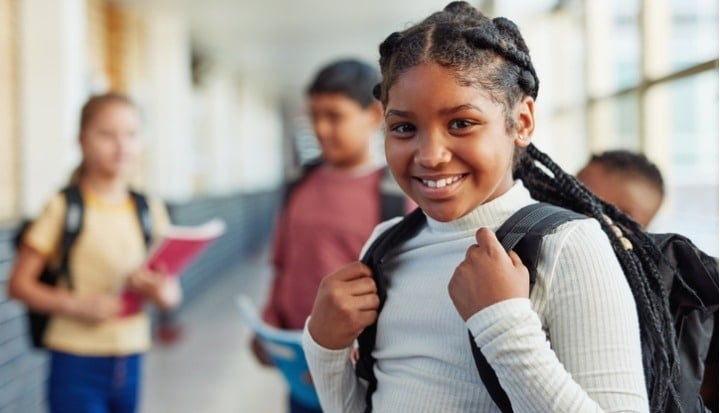WHY: The gender digital divide and low body confidence and self-esteem amongst girls and young women
Girls are a tremendous engine for transformational change. Equipped with the right resources, the world’s 600 million adolescent girls have the potential to become the largest generation of earners, leaders, innovators and change-makers. Globally however, adolescent girls are persistently and disproportionately excluded. Nearly 1 in 4 girls aged 15-19 years is neither employed nor in education or training compared to 1 in 10 boys of the same age.1 And girls continue to be left behind when it comes to skills for future jobs such as science, technology, engineering and mathematics (STEM) including digital literacy.
Specific approaches are needed which involve girls directly to address their unique needs and address these imbalances.
“My idea is to be able to use the digital training I learned in Jordan to invent something that can help people,” says Hala, 15, a Syrian refugee living in Za’atari camp in Jordan. In 2019, Hala enrolled in a UNICEF-supported programme to improve her knowledge and proficiencies in computer and mobile applications and video editing. She now helps her siblings and neighbours to navigate online learning during COVID 19.
There are a range of issues experienced by girls and young women that hold them back from achieving their full potential. Low body confidence and self-esteem is one of these issues, and there is growing evidence that social media further exacerbates this issue. Low body confidence is associated with low educational attainment and also contributes to 8 in 10 girls opting out of important life activities such as socializing with friends and family, 7 in 10 putting their health at risk by not going to see a doctor when they need to and 7 in 10 not speaking their opinion or speaking out for social injustice2.
HOW: Partnering with girls and boys to combat gender stereotypes and promote body confidence
Over the past 3 years UNICEF and Dove have partnered to adapt and integrate Dove’s evidence-based self-esteem and body confidence curriculum (DSEP) within UNICEF’s ongoing collaboration with ministries of education and the private sector across 3 countries. UNICEF and Dove have engaged with and learnt from adolescent girls and boys at each stage of the development and testing process together with local experts and global body image experts from the Centre for Appearance Research (CAR).
Building on UNICEF’s existing education, gender equality and adolescent programmes with national governments, this partnership has adapted and integrated the rigorously tested modules of the DSEP into national government curricula, afterschool programmes, and e-platforms. This approach ensures that context-specific gender and intersectional stereotypes are addressed and self-esteem and body confidence curricula and education becomes an integral part of wider life skills training for both in-school and out-of-school children. Delivering this curriculum to millions of adolescent girls to address some of the known forces that reduce participation and increase absenteeism in school and, in addition, impact their health and agency will help them transition safely into adulthood, and to develop skills to thrive in a rapidly changing world.
WHERE: An example of our work together in Brazil
UNICEF Brazil in partnership with Dove, CAR and Talk2U – a tech based social start-up – co-designed an approach with girls and boys to address issues of body confidence and self-esteem with a digital learning solution. In consultation with 2,000 girls and boys across 11 provinces, content was adapted for an innovative chatbot platform and launched around International Day of the Girl 2021. The chatbot – Topity – is both a conversation and a game, where up to 8 challenges are used to discuss topics related to body confidence and self-esteem in a diverse, inclusive, and engaging experience. Topity addresses the intersectional problems with appearance most pertinent to young people in Brazil such as racism. This innovative approach – of a chatbot – has the potential to be adapted to other contexts, with the hope that crucial body confidence and self-esteem education can be accessed by millions more adolescents around the world.
How can you get involved?
Both UNICEF and Dove have invested substantial resources to develop and implement the chatbot model in Brazil but there is tremendous interest and potential to apply the same approach working with young people and key local partners in multiple countries. With financial support from others, we aspire to partner with young people to promote essential body confidence and life skills content in an effort to promote an equal non-discriminatory world. We also aim to enhance the chatbot and its functionality, making it more interactive and are seeking additional partners to work with us who can share their technical expertise and innovative ideas.
If you are interested in finding out more about UNICEF and Dove’s partnership and how your organisation can get involved, please contact co*******@un****.uk
[1] UNICEF, UN Women and Plan International. A New Era for Girls: Taking stock of 25 years of progress for girls. March 2020.
[2] Dove Global Beauty and Confidence Report, 2017










